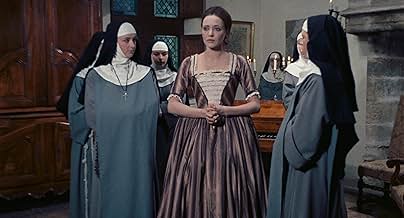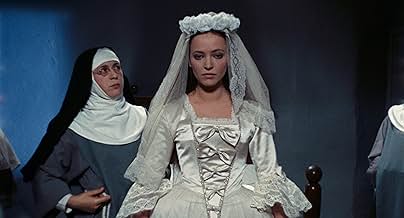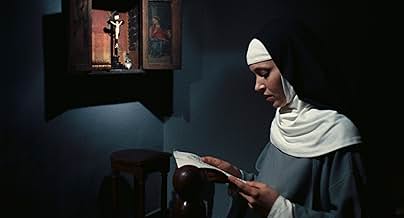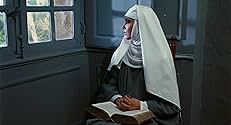Dans la France du XVIIIe siècle, une jeune fille est contrainte contre son gré de devenir nonne. Les trois mères supérieures qu'elle rencontre la traitent de manières radicalement différente... Tout lireDans la France du XVIIIe siècle, une jeune fille est contrainte contre son gré de devenir nonne. Les trois mères supérieures qu'elle rencontre la traitent de manières radicalement différentes.Dans la France du XVIIIe siècle, une jeune fille est contrainte contre son gré de devenir nonne. Les trois mères supérieures qu'elle rencontre la traitent de manières radicalement différentes.
- Réalisation
- Scénario
- Casting principal
- Récompenses
- 2 nominations au total
Ms. Pulver, the beloved eternal comedienne of the German cinema, has taken on that most daunting role: the lesbian Mother Superior, the ultimate debauched nun in the ultimate 'Why was the Revolution necessary?' tale, Denis Diderot's grand tale 'La Religieuse'. Working against type and expectation under the direction of Jaques Rivette, Ms. Pulver has created the most complex and compelling portrait of her long career, and she has done this in ways that deviate radically from her former screen roles.
Ms. Pulver's Mother Superior, emerges in this adaptation with her monumental weakness intact. But something new and affecting is simmering within the character, a damning glimpse of self-awareness. You get the sense that if her frantic movement stops for a second, she'll deflate into a small and bitter creature.
In films like 'Die Züricher Verlobung' and 'Das Wirtshaus I'm Spessart' Ms. Pulver's persona has always been that of a delectable waif, a vulnerable creature with a heart of gold. Here she was cast against type and rumors went that she did not get along with Mr. Rivette. And then, halfway through the film, there she was, and for the first time in her long career she didn't look remotely like an ingénue.
Ms. Pulver's portrait is so intimate and persuasive that you aren't allowed to step back and think, 'What a monster she is.' That's because, thanks to this actress's willingness to turn herself and her character inside out, you've been inside her mind. What a sad and fascinating place it is.
Histoire
Le saviez-vous
- AnecdotesDespite being approved by the Censorship Board the film's theatrical release was initial blocked by the Minister of Information.
- GaffesSuzanne plays and sings the song "Plaisir D'Amour". The final title card identifies the time and place as 'Paris, 1760', but the song was not composed until 1785.
- Citations
Monsieur Hébert: Your superior will shortly be told in the name of Sister Marie-Suzanne Simonin of a protest against her vows with a request to leave religious life and leave the cloister to live her life as she sees fit.
- ConnexionsFeatured in Deux de la Vague (2010)
Meilleurs choix
- How long is The Nun?Alimenté par Alexa
Détails
- Date de sortie
- Pays d’origine
- Sites officiels
- Langues
- Aussi connu sous le nom de
- Suzanne Simonin, La religieuse de Denis Diderot
- Lieux de tournage
- Sociétés de production
- Voir plus de crédits d'entreprise sur IMDbPro
Box-office
- Montant brut aux États-Unis et au Canada
- 30 245 $US
- Week-end de sortie aux États-Unis et au Canada
- 6 273 $US
- 6 janv. 2019
- Montant brut mondial
- 32 659 $US
- Durée2 heures 14 minutes
- Mixage
- Rapport de forme
- 1.85 : 1
Contribuer à cette page


![Regarder Bande-annonce [OV]](https://m.media-amazon.com/images/M/MV5BZjIxOTRkY2ItNjJkOS00ZWMwLWFkM2UtY2FmYzU4NTIyNWQ2XkEyXkFqcGdeQXRodW1ibmFpbC1pbml0aWFsaXplcg@@._V1_QL75_UX500_CR0)





























